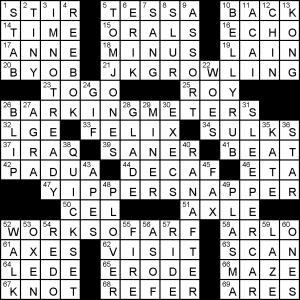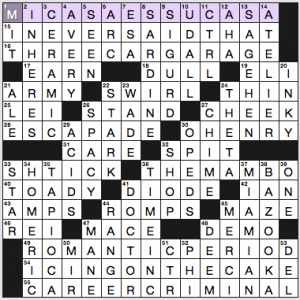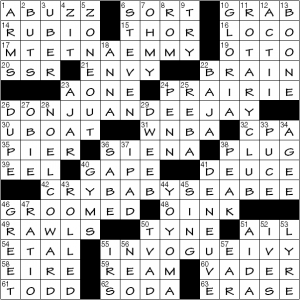David Steinberg’s New York Times crossword—Amy’s write-up
This could be the first 15×15 crossword with a 14-letter, Spanish-language 1-Across. MI CASA ES SU CASA, those are indeed [Welcoming words]. I like how David features triple stacks of 14s here, since too many of the 15s that work out have been used in multiple puzzles and it gets boring. We also have “I NEVER SAID THAT,” THREE-CAR GARAGE, poets and the ROMANTIC PERIOD, ICING ON THE CAKE, and a CAREER CRIMINAL clued deftly as [One who can’t turn right?].
For me, it’s the crossings that make or break triple stacks. If your long Acrosses sparkle but they’re held together by dreck, I scowl. The worst crossers I’m seeing here is ESA, so thumbs up.
Other bright spots in the puzzle include SWIRL, CHEEK clued via cheekiness, ESCAPADE, O. HENRY, SHTICK, classical HOMERIC, and BAZOOKA. Overall, a smooth 70-worder.
Five more things:
- 41d. [One who’s gotten the third degree?], DOCTOR. Although plenty of people go straight from a bachelor’s degree to a doctorate without stopping for a master’s on the way. I also, it must be said, give the third degree to many a doctor.
- 47a. [Old ball and chain?], MACE. I feared the worst after reading this clue and was pleasantly surprised to get a brutal medieval weapon instead of dated sexism.
- 33d. [Critic’s assignment], STAR. As in “I assign this puzzle one STAR.”
- 36d. [Life preserver?], TIME INC. Time Inc. was a subsidiary of Time Warner but was spun back off three years ago. Nobody told me! The Life magazine concept is currently embodied in a photography website Time owns.
- 32d. [Chamber of commerce?], SHOP. Yet another good question-marked clue.
4.25 stars from me.
Randall J Hartman’s Chronicle of Higher Education crossword, “Initial Finishes” — pannonica’s write-up
Wasn’t sure if the title is a nonce phrase or not, but an internet search indicates ample if usually specialized support for it.
Moving on, theme is two-part answers where the initials of the two words in the first part are recapitulated phonetically in the last, or third, part. It’s positively Steigian!
- 17a. [Award won by a documentary about volcanologists in Sicily?] MT ETNA EMMY (Mt Etna, em-ē). Volcanology, vulcanology, take your pick; m-w suggests the former is the preferred spelling.
- 26a. [Wedding-reception hiree who hits on the bride?] DON JUAN DEEJAY (… dē-jā).
- 42a. [Navy engineer who bellyaches about his job?] CRY BABY SEABEE (… sē-bē). m-w suggests one-word crybaby as the only orthographic choice.
- 55a. [Harvard, when it’s hot?] IN VOGUE IVY (… ī-vē).
You see it, right? You know what I’m going to take issue with, right? Of course you do.
A distinct lack of separation within the construction of two of the four themers. The two middle ones. Those phonetic second parts are themselves respellings of initials, albeit different phrases than the first part: deejay for disc jockey and Seabee for Construction Battalion. Can’t seem to find a name for such words, though I’m sure one exists. Oh wait! Looks as if it’s heterograph. Obviously, it’d be unacceptable—thoroughly inelegant—if these entries were straight-up repetitions, i.e. DISC JOCKEY DEEJAY. Nevertheless, it lends a clunkiness to the theme, which otherwise I like.
As for the others:
- Emmy: “Academy founder Syd Cassyd suggested “Ike,” the nickname for the television iconoscope tube. But with a national war hero named Dwight D. “Ike” Eisenhower, Academy members thought they needed a less well-known name. Harry Lubcke, a pioneer television engineer and the third Academy president, suggested “Immy,” a term commonly used for the early image orthicon camera. The name stuck and was later modified to Emmy, which members thought was more appropriate for a female symbol.” (“History of the Emmy Statuette“)
- Ivy: Middle English, from Old English īfig; akin to Old High German ebah ivy. m-w.com
Let’s see, what else?
- 19a [The “O” in FAO Schwarz] OTTO. nb: Not pronounced ˈfī-(ˌ)ō
- 21a [50% of moral indignation, per Vittorio De Sica] ENVY. De Sica, the well-known Neo-Verisimiltudinist film director.
 36a [Italian city famous for its gingerbread-like “panforte”] SIENA.
36a [Italian city famous for its gingerbread-like “panforte”] SIENA. - 27d [Officer who busts Arlo for littering in “Alice’s Restaurant”] OBIE. That old bastard.
- 34d. [“A Death in the Family” author James] AGEE. But it’s all good.
- 35a [Place of warship?] PIER. >groan<
- 61a [Noogie-giving “SNL” nerd __ DiLaMuca] TODD. Played by Bill Murray way back when. Gilda Radner’s Lisa Loopner was his perennial victim. Never knew there was a last name for him.
- 1d [Hugging twosome] ARMS.
- 11d [The first one was convened in Chicago in 1905] ROTARY CLUB. So there’s a … Rotary Connection?
- I feel compelled to point out the explicit dupe in 26-down.
- 28d [Writer who turned down a invitation to play the title role in 1962’s “Dr. No”] NOËL COWARD. Didn’t know this, but it makes perfect sense once you hear it. Three years earlier he played Hawthorne in Our Man in Havana.
Okay, I’m multitasking inefficiently and just making desultory observations here. Bottom line, this was a fun puzzle, well-constructed, but that thing about half of the theme answers irked me.
Jeffrey Wechsler’s LA Times crossword – Gareth’s write-up

LA Times170922
This puzzle theme went to the dogs. We have four puns based on dog sounds. The opener was JKGROWLING which was a strong image, and is clearly the best in the set. BARKINGMETERS is functional. YIPPERSNAPPER (WHIPPER) is starting to stretch things – Y and W don’t sound alike enough for the change to work. WORKSOFARF is overreach in terms of sound change; never mind the idea of a painting depicting noisiness (I mean you CAN paint a dog in the act of barking.)
Notes:
- [It’s not exactly a pick-me-up], DECAF – Why does this exist?
- [News article intro], LEDE. A familiar word with extremely convenient letters. Yet this is one of the first recorded instances of its use ever in a puzzle. Bizarre.
- [Source of much canine delight], BELLYRUB. Bonus answer of a sort. Belly rubs are dangerous with our puppy, as they often lead to champagne showers..
- [Small wading bird], PLOVER. That “small” is a little vague. As waders (in the sense of Charadrii) go, they are about medium; the lapwings (which are related, and sometimes referred to as plovers too) are among the larger. The small members are the Scolopacidae. However, wader can also refer to any bird whose behaviour typically includes wading; in that case “small” is appropriate, when compared to say flamingos or herons… I’m probably overthinking this.
- [State of matter], PLASMA. Physics nerd out. This fourth “natural” state is similar to a gas, but the protons and electrons dissociate… Lightning is a common example. There are even more weird states, but not ones you’re likely to come across incidentally… Not using “phase” here was (I hope) deliberate.
2.25 Stars
Gareth


MACEs don’t have chains, though. A mace is a glorified club. The medieval weapon with a ball and chain is the flail.
Flails, aka chain maces, are sometimes just called “maces.” Even if you argue that’s technically incorrect, it’s common usage. Plus, since “chain” is part of the clue, we can assume this MACE is a chain mace. For a Friday wordplay clue, it seems well within the bounds of the language.
Disagree–it’s not just “technically” incorrect, it is actually incorrect. Even the Wiki page notes that it’s erroneous to refer to a flail as a MACE. Even if that’s a common error (which I doubt it’s all that common, since not many people besides RPGers and medievalists even think much about them), it’s still an error.
Having to know a Spanish phrase or several names that cross it mars an otherwise very nice puzzle IMO. Love Steinberg but I think he failed a bit here.
I found the NYT much easier than I expected. Nicely done! Fun to see ELI not clued as a Yalie… (I was one)
“Mi casa es su casa” is Spanish, yes, but it’s a phrase used (in my experience) by English speaking people who haven’t studied Spanish otherwise—it’s a borrowed expression, perhaps, but pretty well known in the English speaking world. I don’t think of it as a “Spanish” phrase along the lines of “Al que madruga, Dios lo ayuda.”
Authenticity aside—Sadly, there’s plenty of reason to offer shelter in Spanish nowadays, between the hurricanes and the earthquake. It’s terrible to see so many displaced.
I remember once a TV commercial with a woman speaking French to a loved one on the phone, saying literally “I cannot wait to see you….je ne peux pas attendre, etc etc.” Yikes. Not “in the language.”
in the nyt, working off of the I in SARDINE, i confidently entered ICING for that [Cinnabon feature] instead of SWIRL. encountering it correctly in response to [An additional plus] was kinda the cosmic ICING ON THE CAKE.
;-)
Hate to be dim, but why is ONE a “Small square”?
the integer squares are 1, 4, 9, 16, 25 etc
I don’t the see the problem with ESA — it was the first thing I filled in, as it happened.
On the other hand, the clue for PHI might as well have been “random Greek letter,” as far as I’m concerned.
Nice puzzle.
ESA is hardly a household name.
But Phi Beta Kappa, I think, is what the Greek letter clue was going for.
ESA may not be a household name to some, but where three-letter names are concerned, ESA-pekka salonen is a most cross-worthy name indeed. bein’ a star in the world of classical music is tough enuf already! and he’s not exactly a here-today-gone-tomorrow type.
seems like fair play to me to offer a gimme to solvers whose familiarity w/ the arts may be stronger than their familiarity w/ athletics. it seems to me that in crossworld, ESA is the ORR of classical music. another name to keep in your solving toolkit —
;-)
Here’s a pitch for the other ESA, ESA Tikkanen, Finnish star on seven different NHL teams, including 5 Stanley Cup winners, a bona fide character of whom it has been written in Wikipedia:
Tikkanen is famous for his Finnish-English, sometimes referred to as “Tikkanese” or “Tiki-Talk.” Even members of his team often did not understand what he was saying. Wayne Gretzky once commented, “He brings something special. I don’t know what it is, but if you ask him, you couldn’t understand his answer.”
NYT: CTRL and DEL could have used an ALT ;)
Lovely puzzle.
Timely video here.
So my NYT solving experience today was filling in the last letter – the “D” in 26A – and getting the discouraging message that there were errors with the fill. After going through the fill one-by-one several times and not finding anything, I put the puzzle aside for a couple hours.
Finally, it dawned on me that the phrase in 1A was “MI CASA ES SU CASA”, instead of what I had entered, ” MI CASA ES TU CASA”. I feel like the phrase with “TU CASA” is more familiar to me. Did anyone else have a similar issue?
Obviously the real failure on my part is the lack of Norse mythology knowledge, so I need to brush up on that. I know Neil Gaiman published a re-telling last year that I’ve been meaning to read.
“MI CASA ES TU CASA” is entirely grammatically correct, and probably more likely what a Spanish speaker might say, since the “TU” connotes casual familiarity. However, “MI CASA ES SU CASA” is the more common phrase when tossed around by English speakers even though the “SU” connotes formality.
Kind of in the same basket as Lake Lagunita (literally, “Lake Little-Lake”) at Stanford and Los Feliz (locally pronounced as Los FEE-liz) in LA–sometimes foreign phrases get warped…
LAT – A gym exercise is a “chin?”
Dave, are you questioning the word or the lack or the additional word “up” as in chin-up? or the lack of a direct connection between the noun gym exercise and the verb chin. You can do chin-ups in a gym and also chin yourself.
My unknown was REI in an otherwise fairly easy puzzle.
Steve
REI sells tents and other camping equipment (and clothes and all sorts of stuff these days), but you’ve undoubtedly figured that out by now.